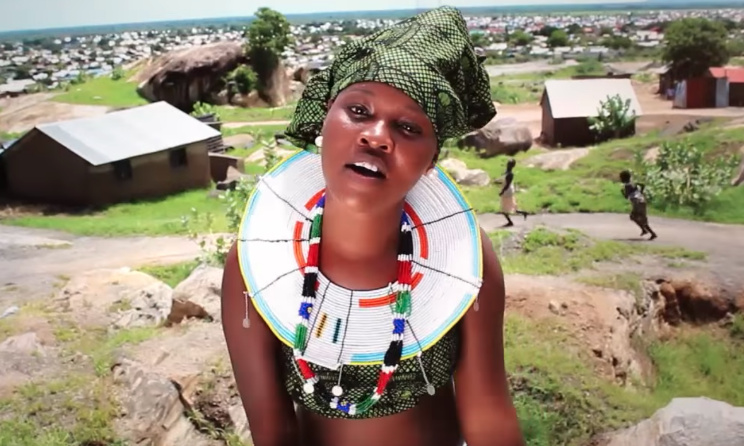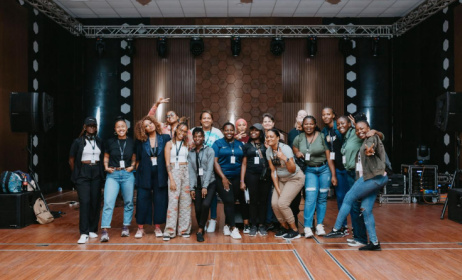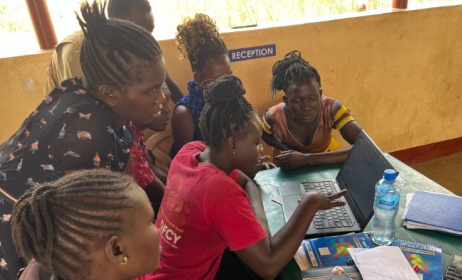Women in South Sudanese music
Since it broke away from Sudan in 2011 to become a sovereign nation, South Sudan has faced chronic instability and significant social challenges[1]. With nearly a third of the population forced to leave their homes, South Sudan is faced with Africa's biggest refugee crisis since the Rwandan genocide, and women and children make up 86% of this refugee population[2]. Despite this prevailing unrest, the influence of young South Sudanese women is steadily growing within the country’s music scene.
 Queen Zee.
Queen Zee.
Women in music pre-independence
Traditional songs play a fundamental role in the lives of the people of South Sudan. They function as a means to chronicle individual relationships, collective experiences and historical events[3]. South Sudanese musical culture boasts a complex taxonomy of songs – praise songs, war songs, songs of initiation, cathartic songs, religious songs – each of which is defined by discernible melodic, rhythmic and performative features[4].
Moreover, women take an active role in the creation of these songs. During the Liberation War, groups of women performed traditional songs to encourage the Sudan People’s Liberation Army (SPLA). In one of the war songs, women praised their men in battle, singing: “The Arabs [a reference to the Sudanese army of the north] said we are afraid / How can we be afraid while John Garang [the SPLA rebel leader] and our men are strong?”[5]
In 2009, Media in Cooperation and Transition (MiCT), an organisation financed by the German Federal Foreign Office, initiated the Sudan Votes Music Hopes project ahead of the referendum that ushered in independence[6]. Musicians from both northern and southern Sudan produced 12 tracks (released on 10 000 cassette tapes) that conveyed messages encouraging peaceful participation in the political process and social change. Three female singers – Mary Boyoi, Yobu Annet, and Sister Dee – featured on the compilation chosen from more than 120 entries, addressing vital social issues facing Sudanese women and girls, such as female genital mutilation, denial of education, forced marriages, honour killings, abductions and rape[7].
Women in music post-independence
'First Lady' Zahara Angelo, popularly known as Queen Zee, emerged as South Sudan’s most popular female singer in the early post-independence period. In 2012, her hit single 'Galbi GiWaja' featuring MJ earned her the accolade for Best Female Artist at the first-ever South Sudanese Music Awards, ahead of stiff competition from Mary Boyoi, Sarah Yong, Nyapal Lul, Ann Lado and Halla Me. Queen Zee also picked up nominations in the Song of the Year, Video of the Year and Best Collaboration of the Year categories at the ceremony, which was held at the Nyakuron Cultural Centre in the capital Juba[8].
Buoyed by her growing influence, in 2014 Queen Zee released the single 'One Nation', a song which explicitly deals with South Sudan’s civil war and the ensuing power struggle during the establishment of the new government[9]. Shortly after the release of the song, she was arrested along with 10 others for allegedly taking part in an incident that resulted in the murder of Mustafa Acuil Tito, a police officer, in Juba. She was released 18 months later after the high court acquitted all the suspects of the murder charges, citing lack of evidence[10]. In January 2017, Queen Zee returned to the music scene with the release of the single 'Rabuna'[11].
Another significant story from the early post-independence period concerns singer Annet Angaika, popularly known as Neetah Baby. Awarded Best Female Artist at the Eye Radio Music Awards in 2016, and currently one of the most popular acts in South Sudan, she didn’t enter the country until she was 15 years old. Born in a refugee camp in northern Uganda, she never met her father, who was killed in the conflict that forced her and her mother into exile. It was only in 2008, when sovereignty was within reach, that her family finally had a chance to return. She turned to singing and, in 2015, produced the hit song 'Binia Wewe' (Foreign Girl)[12].
Impact of female artists in South Sudan
Despite the trials they have faced, several South Sudanese women have successfully used music as a tool to improve the state of their communities.
Before her death in 2012, singer and human rights activist Teresa Nyankol Mathiang brought attention to the suffering of South Sudanese people living in Abyei[13]. The Abyei Area covers about 10 500km² of desert, farmland and oil fields located along the ill-defined border between Sudan and South Sudan. It is claimed by both countries, forming a source of conflict in the region for more than 50 years. In 2013, South Sudanese singers, including such popular female acts as Queen Zee, held a fundraising concert for the Abyei conflict area[14].
This engagement with social issues is common to many South Sudanese artists, with singers known to work with local communities to raise awareness and engage directly with survivors of gender-based violence in providing counselling and referrals for specialist support. Beatrice Toni has also been a vocal advocate for the inclusion of women in politics[15], while Trisha Cee’s 'Asbhur', which tells young girls to focus on education before marriage, was a hit on radio stations throughout Juba[16].
In 2012, the South Sudan Artists Association, in conjunction with telecommunications company Vivacell, organised a nationwide talent search[17]. One of the female contestants, Rebecca Trey, has since become a household name after participating in the competition, which is now held annually[18].
The early success of artists like Queen Zee has been replicated by fast-rising dancehall star Tutu Baibe. In 2015, the singer – who began singing while studying at St Lawrence University in Uganda – became the first female artist to top the radio charts for two weeks in a row, earning her comparisons to Nigerian star Yemi Alade in South Sudanese publications[19].
Resources and citations:
- [1] http://www.sudantribune.com/spip.php?article61108
- [2] https://reliefweb.int/report/uganda/south-sudanese-women-and-girls-arriving-uganda-traumatized-sexual-violence-urgent-need
- [3] http://blogs.bl.uk/music/2014/07/dinka-songs-from-southern-sudan.html
- [4] https://sounds.bl.uk/World-and-traditional-music/Dinka-songs-from-South-...
- [5] http://blogs.bl.uk/music/2014/07/dinka-songs-from-southern-sudan.html
- [6] http://www.mict-international.org/projects/sudan-votes-music-hopes/
- [7] https://soundcloud.com/mict-music/sets/sudan-votes-music-hopes
- [8] http://www.gurtong.net/ECM/Editorial/tabid/124/ctl/ArticleView/mid/519/articleId/6698/categoryId/1/WJ-And-Queen-Zee-Scoop-First-Ever-South-Sudan-Music-Awards.aspx
- [9] https://www.youtube.com/watch?v=cnVntDqbZ5I
- [10] http://www.eyeradio.org/queen-zee-acquitted-murder-charges/
- [11] http://hotinjuba.com/queen-zee-releases-first-music-video-two-years/
- [12] http://www.huckmagazine.com/art-and-culture/south-sudan-returned-civil-war-musicians-new-generation/
- [13] http://www.newtimes.co.rw/section/read/57989
- [14] https://www.voanews.com/a/south-sudan-musicians-raise-funds-abyei/1771280/p1.html
- [15] https://www.voanews.com/a/south-sudan-women-role-transitional-government...
- [16] http://hotinjuba.com/nyibol-grace-baffle-neetahtrishaboyoi-rebekka-from-...
- [17] https://www.musicinafrica.net/directory/talent-search-sudan
- [18] https://www.voanews.com/a/south-sudan-talent-search-idol-music/1744333.html
- [19] http://hotinjuba.com/tutu-baibe-1st-female-artist-to-top-radio-chart-twice/
This article is part of the Music In Africa Connects project, a multi-faceted development initiative aiming to support the music sectors of African countries affected by conflict. To find out more about Music In Africa Connects, click here.
Disclaimer: Music In Africa's Overviews provide broad information about the music scenes in African countries. Music In Africa understands that the information in some of these texts could become outdated with time. If you would like to provide updated information or corrections to any of our Overview texts, please contact us at info@musicinafrica.net.
Editing by David Cornwell



































Comments
Log in or register to post comments